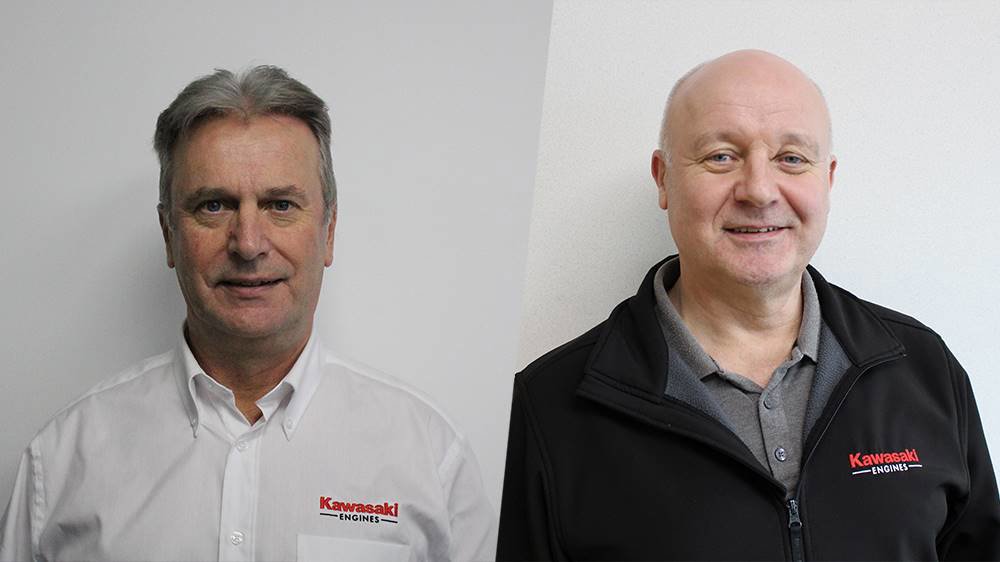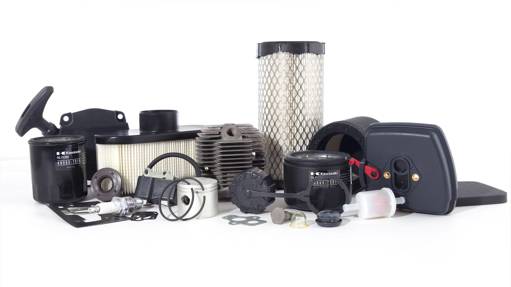Kawasaki Engines genuine parts and non-genuine aftermarket parts: what’s the difference?
9 Mar 2023 Engines & Aftercare
Martin Cook, Parts & Technical Manager and Dave Dunwoody, Technical & After Sales Specialist at Kawasaki Engines each have decades of experience in the industry.
We’ve asked them to clear up what the difference is between official, Kawasaki Engines genuine parts and non-genuine, or aftermarket parts – and how choosing non-genuine could impact your engine.
What do we mean by ‘genuine’ parts?
Dave: When we say genuine parts, we’re talking about the official Kawasaki replacement parts. They’re the same as the parts that were originally fitted in our factory; designed, tested and manufactured to our specifications.
Non-genuine parts are any replacement parts that aren’t produced by the original manufacturer. Typically, this is talking about aftermarket parts.
These manufacturers have to do their own investigations and try to get the part to be as close a copy as they can – they don’t have access to our specifications, which, in any case, aren’t static, and are modified regularly to make improvements, so there’s always some guesswork in aftermarket designs.

What is the difference in quality?
Martin: If they can make it cheaper, there’s a reason for that! The materials can be of inferior quality, they may not be designed to the spec, and they certainly aren’t held to the same testing standards – our testing process is extremely thorough and quality control is taken very seriously.
Just as an example of the quality difference – a Kawasaki air filter has a lower micron rating and more folds than a non-genuine air filter. This means that the pores of the filter element are smaller, allowing the filter to trap a wider range of contaminants, including the more minute particles. The non-genuine part, on the other hand, will usually let some debris pass through. This degrades the engine over time, causing wear and tear, increasing your oil consumption, and making your engine unreliable – meaning you’ll have to get it serviced more often.
Besides all the testing and engineering knowledge, when we’re talking about quality you should bear in mind that Kawasaki genuine parts are made to maximise performance, aftermarket parts are designed to be cost-effective. There’s always going to be a gap in quality with such different objectives.
How do you guarantee that genuine parts are the highest quality available?
Martin: As we’ve just mentioned, being designed to the exact specifications by engineers with intimate knowledge of the engine makes a big difference, as does making quality a priority.
We prove our parts are robust enough to cope with commercial-level usage through an intensive testing process.
We have a huge testing facility in the US, where genuine parts are tested in all kinds of conditions. We know they can withstand everything from sub-zero temperatures to the toughest working conditions, and hours upon hours of heavy-duty use. They’re the best possible part for your engine, it’s really as simple as that.
What are the issues with using non-genuine/aftermarket parts?
You have invested in your business with a high-quality, high-performance engine. By cutting corners – and for a relatively small saving – you’re risking that investment.
Martin and Dave explain the potential consequences of using aftermarket parts.
Dave: The most obvious potential risk, and I’m sure one landscape professionals are particularly concerned about, is that aftermarket parts can cause significant damage to the engine, and in extreme cases, cause it to fail. But often the damage is more subtle than that. Non-genuine filters can cause more gradual wear and tear that shortens the engine’s lifespan and impacts performance levels.
It’s not as easy to spot as a catastrophic engine failure, but it’s still harming your engine. Longevity, efficiency, performance; they’re all reduced by a poor quality part, and sometimes the impact is significant. Generally, using non-genuine parts makes your engine more unreliable and it will need to be serviced more often.
Martin: There’s no quality guarantee with aftermarket parts. We’re not suggesting that every aftermarket part available is going to destroy your engine, but it won’t help your engine perform to the level it can and should be at. That initial cost saving could quickly be swallowed up by the cost of repairs, or even the increase in oil and fuel consumption from reduced efficiency.
Risk of potentially much higher costs down the line
People typically turn to aftermarket parts to save on costs, but they’re taking a risk that can create much larger problems and expenses; whether they feel those consequences immediately or much later varies.
These are a few potential expenses you could incur by using non-genuine parts:
- Worst case scenario; engine failure. A replacement engine can cost between €2000-€3000. Wear and tear reducing engine longevity also brings this cost around quicker
- Carburettor cleaning €100-€300, while a carburettor replacement could be anywhere between €50 - €500
- To decoke the engine (take apart to clean build-up of debris) €500
- Issues with the fuel filter could damage the injectors. Replacement injectors are €100 each, and as it’s always both that will be replaced, it could amount to €500 including the labour charges.
It’s easier to put a price to the expenses above, but there are hidden costs to consider as well. Hits to efficiency and productivity, plus the working hours lost while equipment is in a workshop, can quickly add up to a sum far beyond the price difference of a genuine and non-genuine part.
Does using aftermarket parts invalidate warranty?
Dave: If the aftermarket part is found to be the reason for engine failure, then yes, it would invalidate the warranty.
You’re not going to invalidate the warranty just by using an aftermarket part as a replacement, but if it causes the issue then either the claim or warranty will be voided, depending on the case.
So, how can you get hold of Kawasaki Engines genuine parts?
Dave: By purchasing parts through an Authorised Kawasaki Engines Dealer. Our network of Kawasaki dealers is spread across Europe – you can use our interactive map to find a dealer close to you. Packaging for genuine parts will always have a ‘Genuine Kawasaki’ label.
You may be interested in
-
How long do Kawasaki engines last?

-
A match made in heaven: how do we pair Kawasaki engines with the machines they power?

-
How do we guarantee quality at Kawasaki Engines? A behind-the-scenes look into our US manufacturing plants

-
4-stroke engine maintenance: a how-to guide

-
Spot the difference: a side-by-side comparison of genuine and aftermarket parts.

-
Winter pre-storage preparation for your Kawasaki powered equipment







